Chautauqua: The Most American Thing In America.
On August 16, 2023 I delivered a “Chautauqua Lecture” standing where Salman Rushdie stood when he was attacked one year earlier.

The Chautauqua Institution was thrust into the spotlight on August 12, 2022 when Salman Rushdie, standing onstage, was stabbed in front of thousands of people. Several quick-thinking and courageous Chautauquans rushed the stage and subdued the attacker. But not before Rushdie was severely wounded. Henry Reese, there to interview Rushdie, was also injured, as were some of those who tackled the assailant. The attacker, who is being rewarded with farmland by The Foundation to Implement Imam Khomeini's Fatwas (yes, that is a real foundation), awaits trial, charged with assault and attempted murder.
Although Rushdie must now grapple with blindness in one eye, the loss of the use of one hand, and the psychological ramifications of his attack, he says he remains optimistic and is recovering well.
Michael Hill, the President of The Chautauqua Institution, refused to allow Chautauqua’s speakers to be silenced. “Our mission is to build bridges across difference,” he told reporters in the immediate aftermath of the attack. “Mr. Rushdie is known as one of the most significant champions for freedom of speech. One of the worst things that Chautauqua could do is back away from its mission.”
Hill not only ensured Chautauqua’s continued defense of freedom of speech last year, but for this year, offered a week of sessions dedicated to its role in preserving and advancing democracy. It was for that week I was invited to speak, sandwiched between lectures by Jacob Mchangama, Anna Deavere Smith, Bob Woodward, and a conversation with David Axelrod and Karl Rove.
Among this year’s Chautauqua speakers: Jennifer Senior, Monica Guzman, Brian Greene, Bill Kristol, Walter Russell Mead, Cornel West and Robby George. Past speakers include many you might recognize, including Pamela Paul, Michael Sandel, Rabbi David Wolpe, David French, David Brooks, Arthur Brooks, Jeff Rosen, Jonah Goldberg, Grover Norquist, Noah Feldman, Bari Weiss, Suzanne Nossel, Gillian Sorensen, Lawrence Krauss, and Christine Rosen—who is responsible for my invitation. (You can see her phenomenal Chautauqua lecture here if you’re a Chautauqua subscriber).
Having never been to Chautauqua, I asked some friends what it’s like. To a person, they described Chautauquans as warm and welcoming. But when I asked for details about Chautauqua, everyone told me I’d just have to see it for myself.
Now I understand why. “There's no place like it,” historian David McCullough once said. “It is at once a summer encampment and a small town, a college campus, an arts colony, a music festival, a religious retreat, and the village square.” It’s a bucolic gated village of Late Victorian and Second Empire architecture with large front porches and an ethos of a family reunion, where the president of the Chautauqua Institution is the Mayor. (No joke — he is actually the Mayor.)
Chautauqua is a place out of time. I felt I had stumbled upon Brigadoon.
Established in Chautauqua NY in 1874 as a retreat for Methodist Sunday School teachers, Chautauqua (pronounced “Shuh-TAW-Kwa”) became a movement similar to the “Lyceum movement” of the 19th century. Arts, Education, Religion, and Recreation comprise its four pillars, and the nine-week summer season of “learning vacations” includes daily activities in each area, with the Chautauqua Lecture the focal point of the program.
“There's no place like it. No resort. No spa…
It is at once a summer encampment and a small town, a college campus, an arts colony, a music festival, a religious retreat, and the village square.”
David McCullough
McCullough described it as “part of the American Imagination.” It’s “one of those places that help define who we are and what we believe in. It has its own mythic force.” Generation after generation, families return to for the Chautauqua experience — something like summer camp, but for adults. Children lucky enough to have Chautauquan parents grow up going to the kids camp while their parents attend lectures and participate in other activities. As adults, those Chautauquan children return with their own children and do the same.
With a dedication to “the exploration of the best in human values and the enrichment of life” as well as current religious, social, and political issues, Chautauqua is an expression of our American ideals. By 1921, six American Presidents had visited. Theodore Roosevelt, who visited four times, called it “the most American thing in America.” (His famous 1905 Chautauqua Lecture can be found here.)
Standing onstage at the Chautauqua amphitheater and speaking about overcoming obstacles to a flourishing liberal democracy was sobering. But the audience lived up to its reputation as exceptionally warm and welcoming, and the week about freedom of expression and democracy was the most highly attended of the summer. Many in attendance had witnessed the attempt to take Rushdie’s life. Some were even among those who rushed the stage to take down the attacker. I left Chautauqua with renewed hope. Only after returning home did I learn that Theodore Roosevelt said of Chautauqua, “there is probably no other educational influence in the country quite so fraught with hope for the future of the nation.”
Without realizing it, I wrote my lecture in that tradition of hope. It is available by clicking the button below.
“There is probably no other educational influence in the country quite so fraught with hope for the future of the nation as this and the movement of which it is the archetype.”
President Theodore Roosevelt
Chautauqua, 1905
(For access to the entire library of lectures and for a virtual front-row seat to next-year’s season, you can subscribe here.)
More to come…




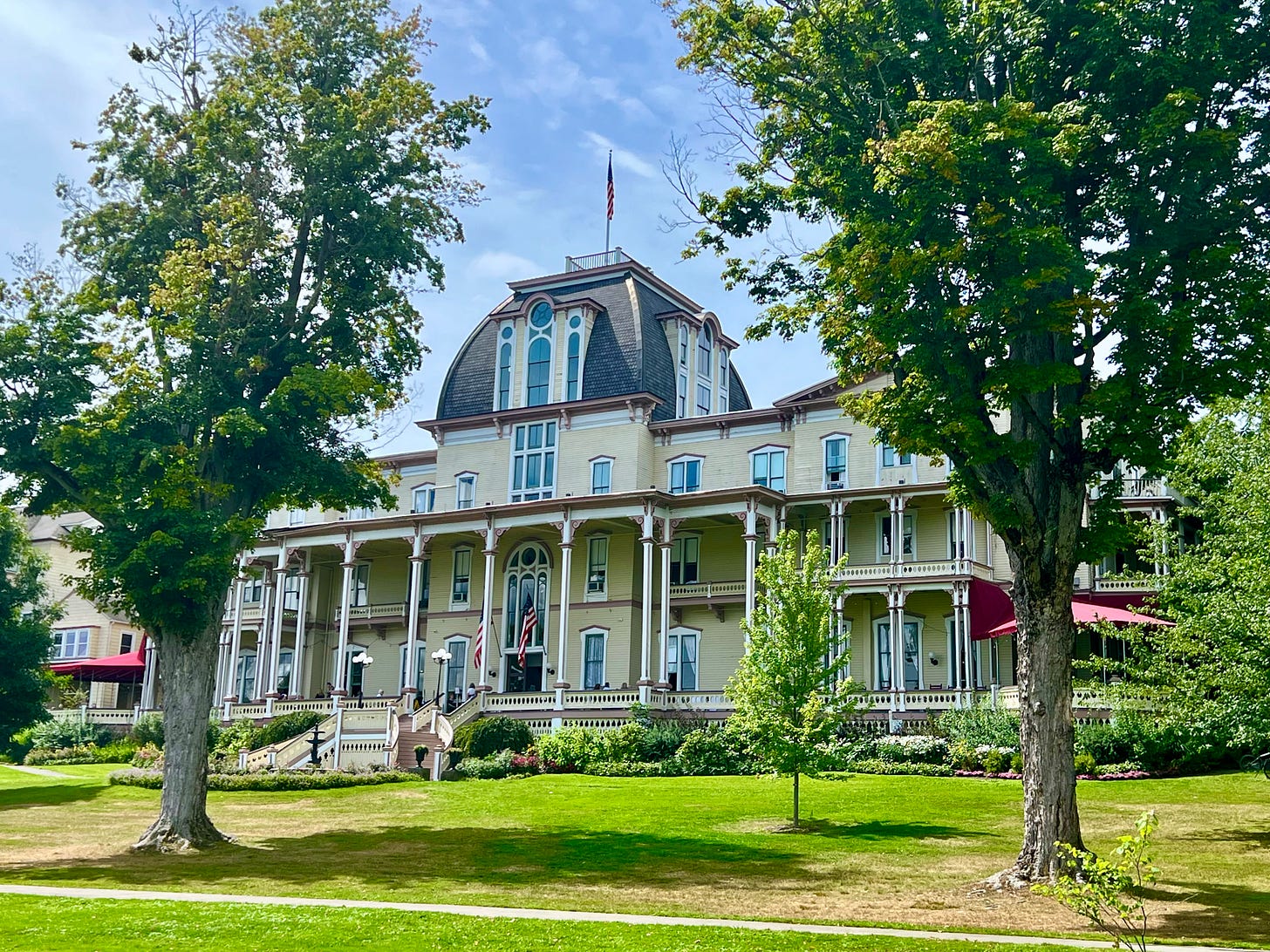
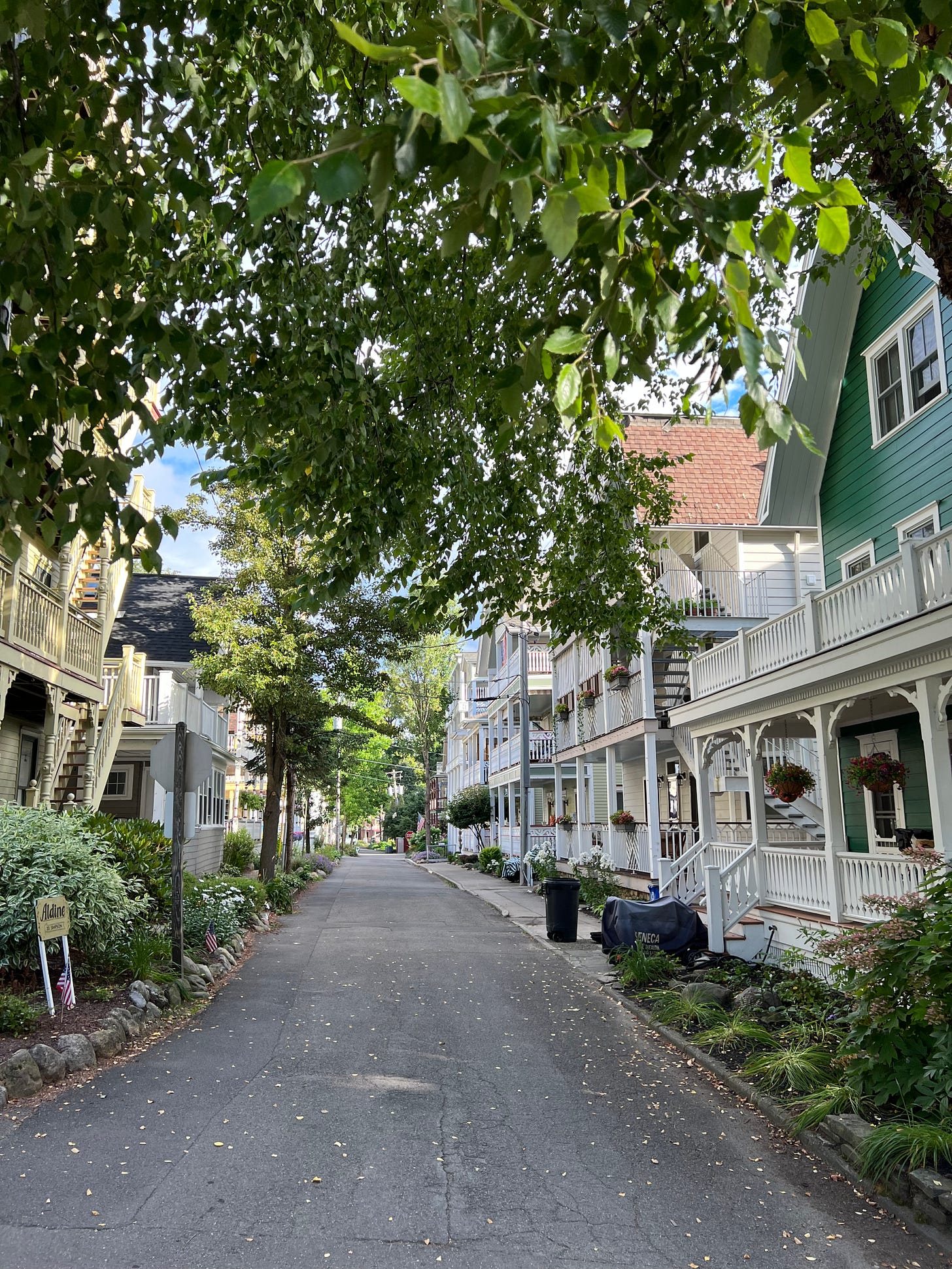


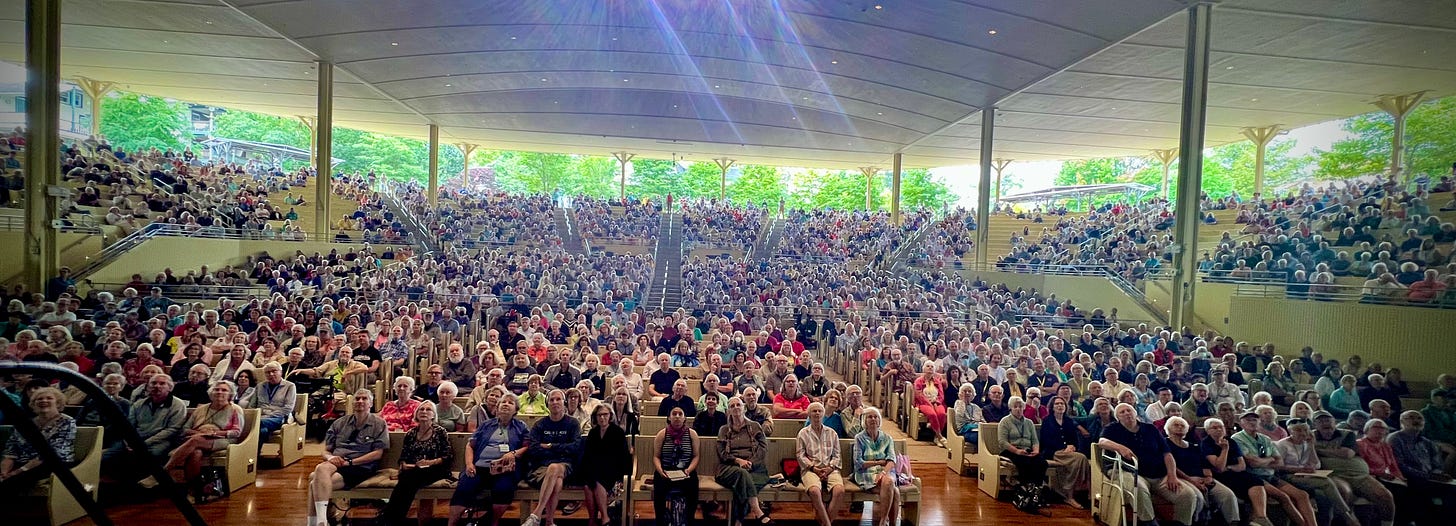
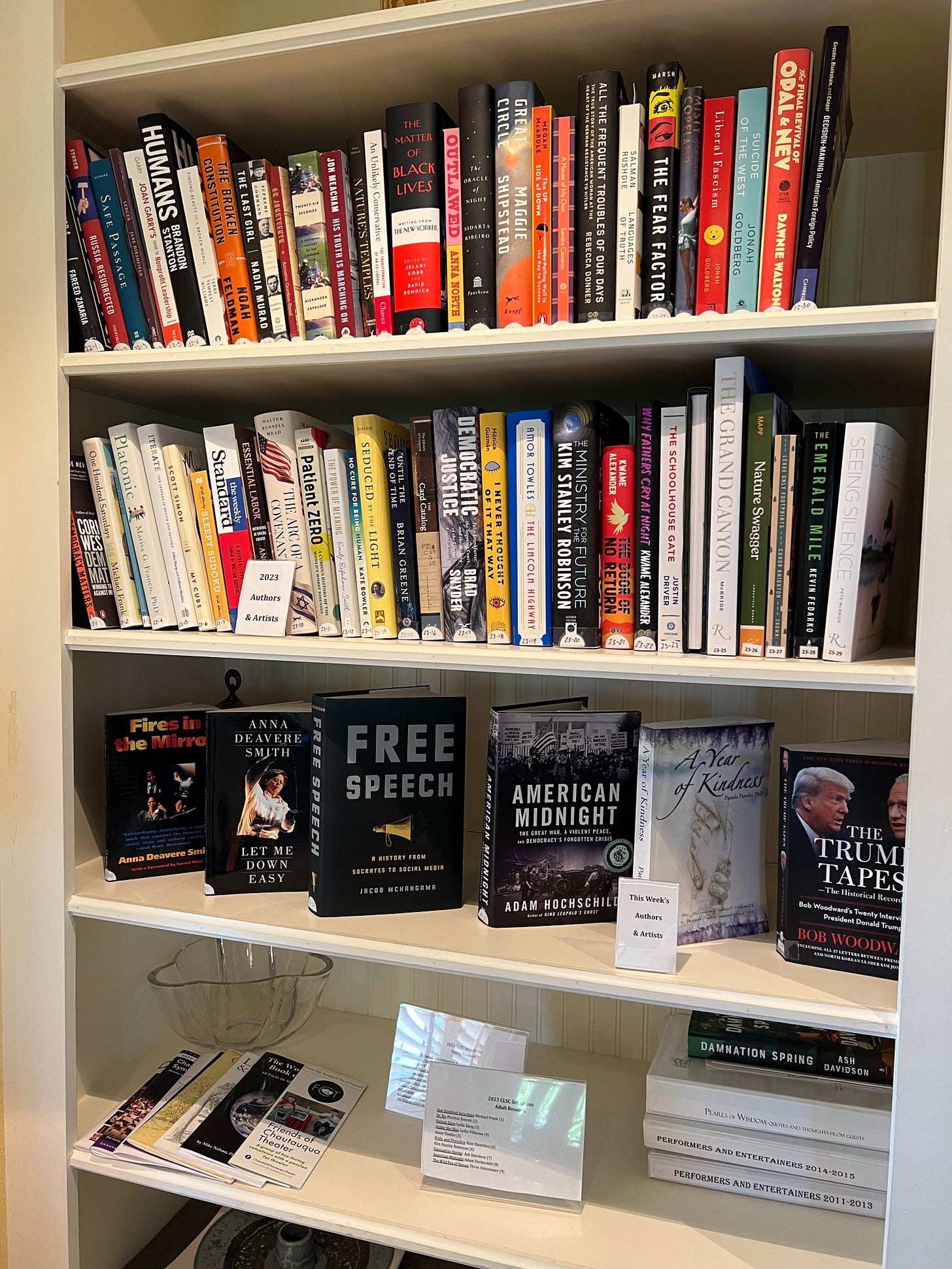
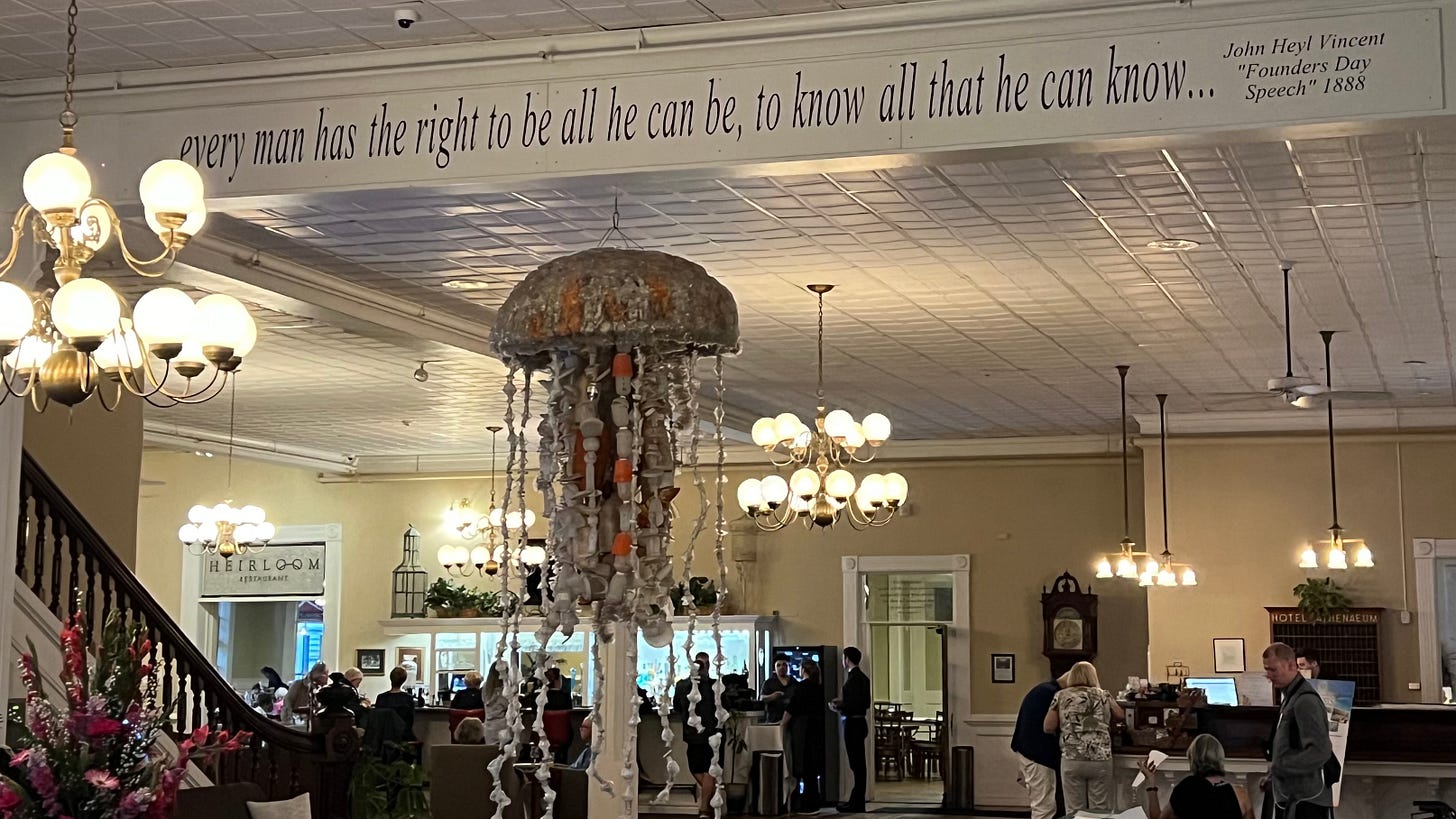

A major thing to notice about Chuatauguans is that they are old. The same talk given to a representative sample of college students would get a different reception.